Common Connection Errors / Solutions HYBR Error - Poor Network Connection The HYBR Error can have several causes. Most of the time this error can be easily resolved by rebooting your computer. Simply turn your computer off completely and then back on again. If you continue to receive this error, then the information below should help you to identify and resolve this issue. Let our new Connection Wizard pinpoint your problem! The BlueLight Internet Connection Wizard is our newest help tool. Download it today to identify and resolve many common issues that may prevent you from successfully connecting to the Internet. To use the BlueLight Internet Connection Wizard, you will need to have a Windows Operating System (other than Windows NT) running on your computer. If you cannot download the BlueLight Internet Connection Wizard from your computer, simply download it onto a diskette from any computer with Internet access and then install it on the computer you would like to fix. Click here to download the Connection Wizard. |
A. Reboot your computer Most of the time HYBR errors can be easily resolved by rebooting your computer. Simply shut down your computer then turn it on again.
B. Adjust your firewall settings If you are using a Firewall program, please disable it temporarily and try connecting to BlueLight Internet. If you are able to connect successfully, you will need to refer to your Firewall program's documentation on how to configure your Internet security settings to be less restrictive.
C.Verify your modem settings If your modem is not configured correctly, you will experience problems connecting. To verify your modem settings, please follow the steps below. - Click on the Windows Start button, point to Settings and select Control Panel.
- Double-click the Modems icon.
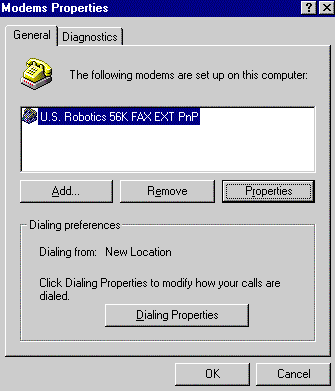 - Click once on the modem that is installed to highlight it and click on the Properties button.
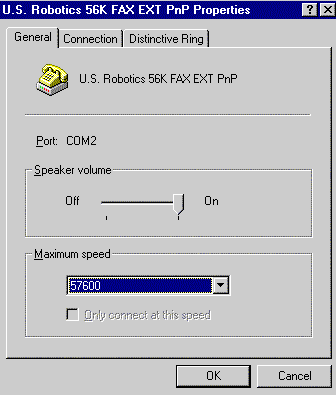 - Select the General tab and look for the Maximum Speed section. Change the settings to match your modem.
A. If you have a 28.8 or 33.6 modem, select 38400.
B. If you have a 56k Flex modem, select 57600.
- Verify that the box for Only connect at this speed is NOT checked.
- Click OK, then OK again and close the Control Panel.
Note: Windows ME users, DO NOT close the control panel. Skip to number 8.
- Double-click the My Computer icon on your desktop.
- Double-click the Dial-Up Networking icon.
- Click once on the BlueLight Internet icon to highlight it. From the File menu, select Properties.
 - Ensure the correct modem is selected in the Connect using field.
- Click on the Configure button.
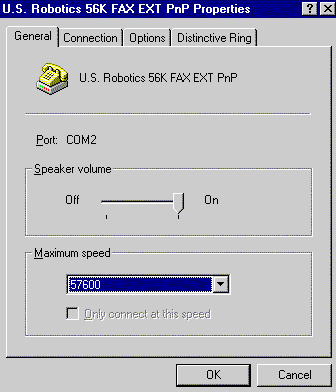 - Select the General tab and look for the Maximum Speed section. Change the settings to match your modem.
A. If you have a 28.8 or 33.6 modem, select 38400.
B. If you have a 56k or Flex modem, select 57600. - Verify that the box for Only connect at this speed is NOT checked.
- Click OK, then OK again and close the Control Panel.
Try your BlueLight Internet connection again.
D. Remove the BlueLight Internet Dial-Up Networking connectoid If the steps above did not resolve the issue, please follow the steps below to remove the BlueLight Internet Dial-Up Networking connectoid. The connectoid will be recreated the next time you log on to BlueLight Internet. - Click on the Windows Start button and select Programs.
- Select Accessories, then Communications.
- Select Dial-Up Networking.
- Click once on the BlueLight Internet icon to highlight it.
- From the File menu, select Delete.
Try logging on to BlueLight Internet again.
E. Try a different access number and use three commas Your connection may have been dropped due to technical difficulties with the access number you are using. Try connecting to BlueLight Internet again. If the problem persists, try using another access number in your area. For instructions on how to change your access number, please click here. You can try entering three commas after the phone number, which in some cases solves the problem. Try the following steps: - Double-click the BlueLight Internet icon on your desktop.
- On the Welcome screen, click the Setup button.
 - On the Welcome to NetZero Setup screen, click Locations.
 - The Dialing Location screen will appear. Make sure your Dialing Location is selected and click Modify.
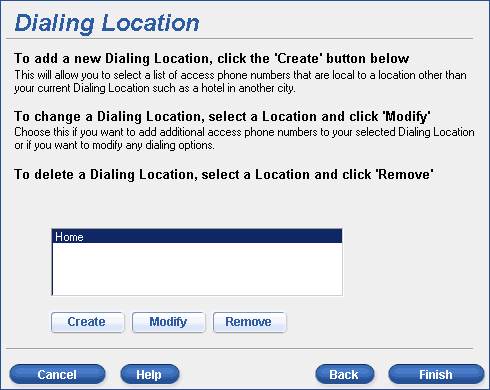 - The Set Up a Dialing Location screen will appear.
 - Click Advanced.
- On the Advanced Dialing screen, enter three commas to the Suffix section.
 - Click Continue.
- Click Continue again
- On the Select Access Numbers screen, click Continue.
- The Congratulations screen will appear, displaying your access numbers with the commas at the end.
- Click Finish and retry your BlueLight Internet connection.
Placing 3 commas after the phone number will pause your computer's modem to wait for the signal (56k) coming from your access number's modem. If some brands of modems do not receive the signal immediately, they will automatically disconnect or look for the next connection speed (33.6k, 28.8k, etc). Although your access number's modem tries to connect at 56K, your computer's modem may try to connect at 33.6k or lower, possibly resulting in no connection at all.
F. Windows 95 Users: Make sure the latest version of Dial-Up Networking is installed If you are running Windows 95, you may need to download the latest version of Microsoft Dial-Up Networking (version 1.4). Click here for instructions with pictures.
G. Verify your Windows Network settings, adding components as needed If the problem persists, follow the steps below to verify your network settings. - Click on the Windows Start button, point to Settings and select Control Panel.
- Double-click the Network icon.
- Check to see if you have the following components:
Note: If you are on a Network or company LAN, contact your system Administrator before making any network changes. If the components listed above are not present, then add the missing component(s). IMPORTANT! Only add a component if it is not already present. If the component is listed, you will not need to add it. To Add Client for Microsoft Networks: 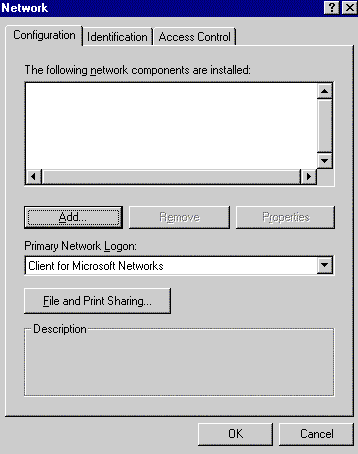 - Click on the Add button.
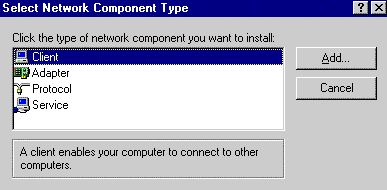 - Select Client.
- Click on the Add button.
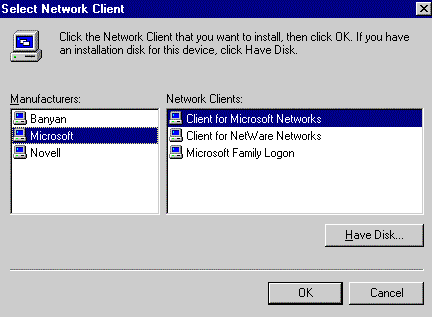 - Under Manufacturers, select Microsoft.
- Under Network Clients, select Client for Microsoft Networks.
- Click OK.
To Add Dial-up Adapter: - Click on the Add button.
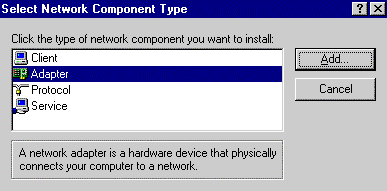 - Select Adapter.
- Click on the Add button.
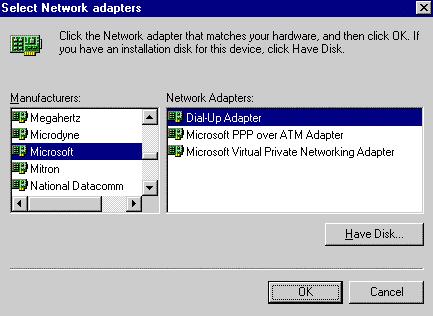 - Under Manufacturers, select Microsoft.
- Under Network Adapters, select Dial-Up Adapter.
- Click OK.
To Add TCP/IP: - Click on the Add button.
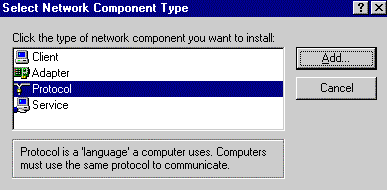 - Select Protocol.
- Click on the Add button.
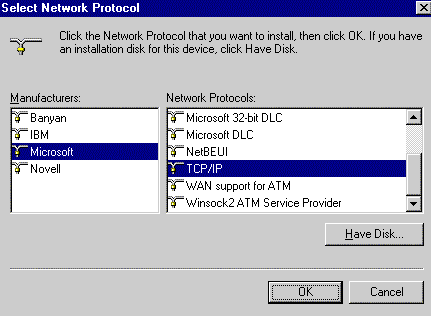 - Under Manufacturers, select Microsoft.
- Under Network Protocols, select TCP/IP.
- Click OK.
Once you've added any necessary components, follow the steps below. - Click once on TCP/IP to highlight it and click on the Properties button.
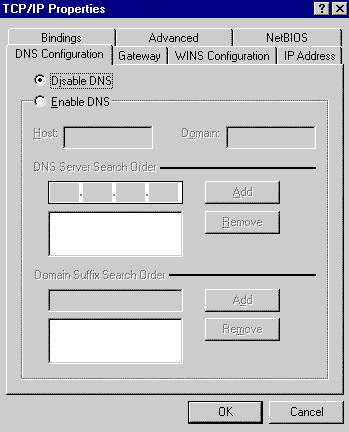 - Select the DNS Configuration tab and ensure that Disable DNS is checked.
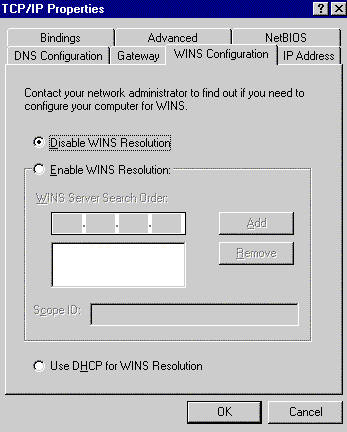 - Select the WINS Configuration tab and make sure that Disable WINS Resolution is checked.
- Click OK.
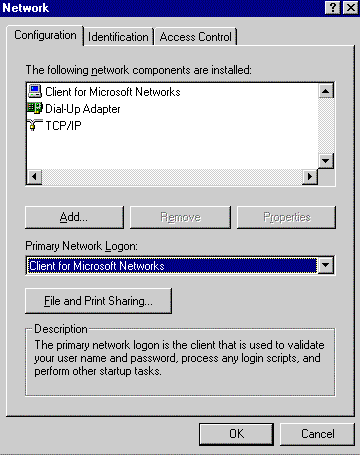 - In the Primary Network Logon field, ensure that Client for Microsoft Networks is selected.
- Click OK.
- Click on Dial-up Adapter once to highlight it.
- Click on the Properties button.
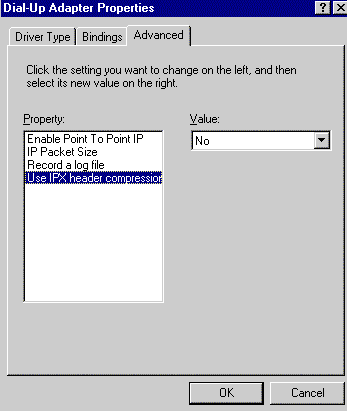 - Select the Advanced tab and click once on IPX Header Compression to highlight it.
- Under the Value drop-down menu, select NO.
- Click OK and OK again.
- When you are prompted to restart you computer, click YES.
H. Upgrade your Modem Drivers or enter an initialization string Modem drivers and Initialization Strings help your modem communicate properly with other modems, thus ensuring a more stable Internet connection. You can download modem drivers and obtain initialization strings for most modems at the following links: Once you have an initialization string for your modem, you can enter it in by following the steps below. - Click the Windows Start button, and select Programs, Accessories, and Communications.
- Select Dial-Up Networking.
 - Click once on the BlueLight Internet connectoid to highlight it.
 - From the File menu, select Properties.
 - Click on the Configure button.
 - Select the Connection tab.
 - Click on the Advanced button in the lower right corner.
 - Type the initialization string in the Extra Settings textbox.
- Click OK, then click OK again.
- Close Dial-Up Networking and My Computer.
- Retry the BlueLight Internet connection.
| |
